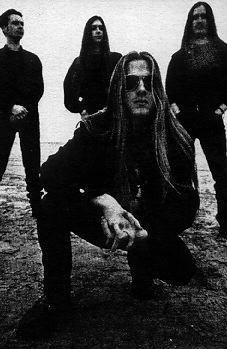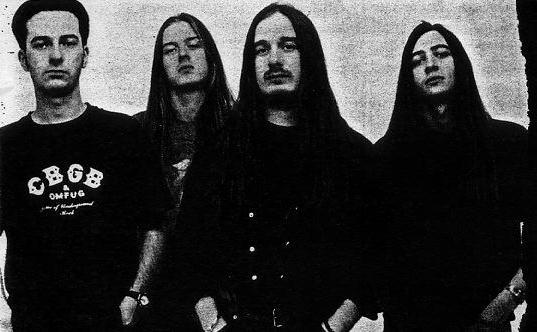

Now looking to cross over to a wider rock/metal audience, one-time extreme metallers Carcass are nevertheless unlikely to become the next Bon Jovi. "I don't think we're going to be prostituting ourselves that much," Jeff Walker tells Mark Day.
 "Do we pull shapes when we rehearse? No, we just sit around, we don't
go through the motions. The days of being youthful and getting excited
about rehearsing are long gone."
"Do we pull shapes when we rehearse? No, we just sit around, we don't
go through the motions. The days of being youthful and getting excited
about rehearsing are long gone."
Sitting among the amps and guitar stands that litter the band's Liverpool rehearsal room, Jeff Walker of Carcass looks vaguely appalled at the idea that the band might be prone to foot-on-the-monitor-type antics in private.
"We're pretty introverted people anyway," he explains sheepishly. "It's only after a few pints of lager and in front of a few hundred people that we make fools of ourselves."
Carcass are limbering up for an extensive British tour, in part to belatedly promote their Heartwork album, released back in '93. A tight mesh of guttural vocals and dense, distorted guitar riffs, it nonetheless highlighted the band's propensity for polished metal soloing and finally laid to rest the messy gore-fest imagery that Carcass had toyed with. An ironically overplayed piss-take on the relentless extremity of death metal, it had long since ceased to be funny.
"Well, when we started we didn't have a seven-album recording contract or anything," says bassist/vocalist Walker, by way of mitigation. "It was just totally nihilistic; we just wanted to make a really over-the-top album that we knew would get totally blacklisted. We weren't taking ourselves that seriously, but it was totally arty pretension if you ask me."
Carcass no longer cover their record sleeves with real-life autopsy photos. Walker admits that, as the band took off, they were "forced to re-assess what we were doing".
These days, people talk about Carcass in terms of crossover potential. While Machine Head emerged out of the bog standard Bay Area chugging of Vio-lence, and Pantera have incrementally increased the aggression between Cowboys From Hell and Far Beyond Driven, Carcass, starting from the most extreme end of the spectrum, have refined and evolved their sound to meet these metal notables somewhere in the middle. Some people even talk about Carcass in terms of old-school British metal, though Walker thinks that's going a bit far.
"You make one passing comment, and the next thing people start going on about Iron Maiden or whoever. Sorry, but if you play our record next to Iron Maiden's... Well, there are some riffs that might be akin, but it's very contemporary what we're doing; it's hardly a throwback to the '80s."
So Carcass don't really worship at a shrine of old Saxon albums then?
"I grew up into punk and stuff, but I'm 25 now and I could listen to Saxon and probably appreciate part of it," laughs the bearded bassist. "It's not like being some fashion victim who's just into one thing. At the end of the day, I like rock music, be it punk or heavy metal. Ken (Owen, drums) and Bill (Steer, guitar) are the ones who grew up more into cheesy heavy metal. But then again Bill was playing in Napalm Death when they were at their most cutting. So it's hardly had a detrimental effect on us."
Carcass enjoy a strange kind of success. Like many of the bands who emerged from the anarcho-punk scene, they sidestepped the usually disasterous 'big hope of British rock' tag, and plugged into a thriving international network that more mainstream rock acts could never hope to match.
"Pick up any of the glossy rock mags and see the bands on the covers. Well we sell more records than a lot of these bands on a worldwide basis," notes Walker. "In Japan, North America, Europe... It's not just concentrated on the British thing. But a band like ours, we've never gone out of our way to have a career, it's just that people like what we do."
Three albums in, Carcass have branched out to the point where they've toured with the likes of Ice T, though guesting on his first, under publicised UK Body Count tour, they ended up playing to Ice's less metallic fans.
"The majority of the crowd were rap kids, but we got a good reaction because there was a hardcore every night that had come just to see us. It was good. We wouldn't have got to play Brixton Academy otherwise! But a lot of people just came to see Ice T himself, not Body Count."
Anything else planned along similar lines?
"We definitely want to cross over. But within..." Walker pauses for a moment. "Well, for example, we just toured America with Life of Agony. Obviously the idea was to get some sort of crossover, but so-called pseudo-hardcore fans, they're so bigoted they're just not interested. But a so-called metal audience is a bit more open nowadays."
Still, aren't Carcass restricted by what their audience expects of them? Do they really have that much freedom to experiment?
"We don't play up to what people expect of us. For example, we've got 11 new songs now, and none of it's got the extreme blast-beat stuff in it. We feel confident that if we please ourselves we'll please other people who like Carcass for whatever strange reason."
And what pleases Carcass these days?
"It's a lot more mid-paced, more controlled, more rocky, more traditional, really. But it's still going to have the same dense guitar sound and my vocals are going to be, y'know..."
Yes, I know. Carcass may be capable of the kind of measured, razor-sharp riffing that pulls them out of the mire of identikit death metal bands, but Walker's not about to abandon the old throat-garroted vocals just to appeal to the mainstream.
It's going to put a lot of people off, I suggest.
"The other side of the coin is a lot of people like it. That's part of our sound. I can't really develop a James Hetfield growl, and it seems that that's all some people want when it comes to rock - everything to sound like Metallica."
Is it any way for a grown man to communicate?
"Is screaming your balls off like Bruce Dickinson? Or is singing like Axl Rose? A lot of these so-called singers can't sing! Of course we come from the death metal side of things, but the thing that's fueling me is more the punk thing I grew up with. It's not trying to sound 'evil' or anything. It's just so natural for me to do that, just part of the aggression that comes through the music. It's like saying: 'Isn't it stupid, the way our guitars are tuned?'"
Walker blabbers on at great length about how Carcass tune "five semi-tones below concert pitch" - which is even lower than Black Sabbath, apparently. I've got no idea what he's on about, but apparently it's part of the reason why Carcass sound the way they do. Die-hards worrying that Carcass are about to turn into the new Bon Jovi might well find this reassuring, along with the news that their next album (which they'll record next spring) will still be produced by extreme metal stalwart Colin Richardson, "if his ego hasn't gotten too big since he recorded the Machine Head album!"
With new guitarist Carlo Regadas in tow (the last one "got lazy"), Carcass have thrown in their lot with Columbia Records. Walker's got few kind words for their former label, Earache, which we'll gloss over here (because there's nothing as boring as musicians moaning), and leave the man contemplating life in the big league.
"Now we're signed to a real record company, we have to think about things like, 'Do I do my hair a certain way today?" he smiles. "Still, I know we're still pretty flakey, and we're choosy about what we do. I don't think we're going to be prostituting ourselves that much."
Despite having roots in the English hardcore scene (Bill Steer was originally a guitarist for Napalm Death), Carcass began life as an out-and-out death metal band. The cover of their first album, Reek of Putrefaction, was a collage of photographs from various hospital operations and other sources of real-life gore. And the music matched this note for note.

Quick, get these men a drink and an audience: "It's only after a few pints of lager and in front of a few hundred people that we make fools of ourselves," says Jeff Walker.